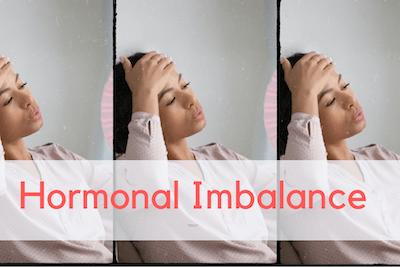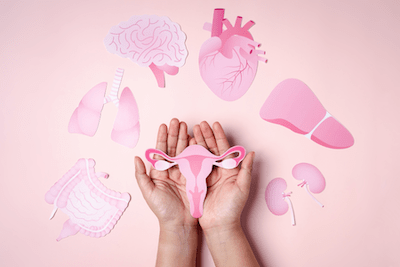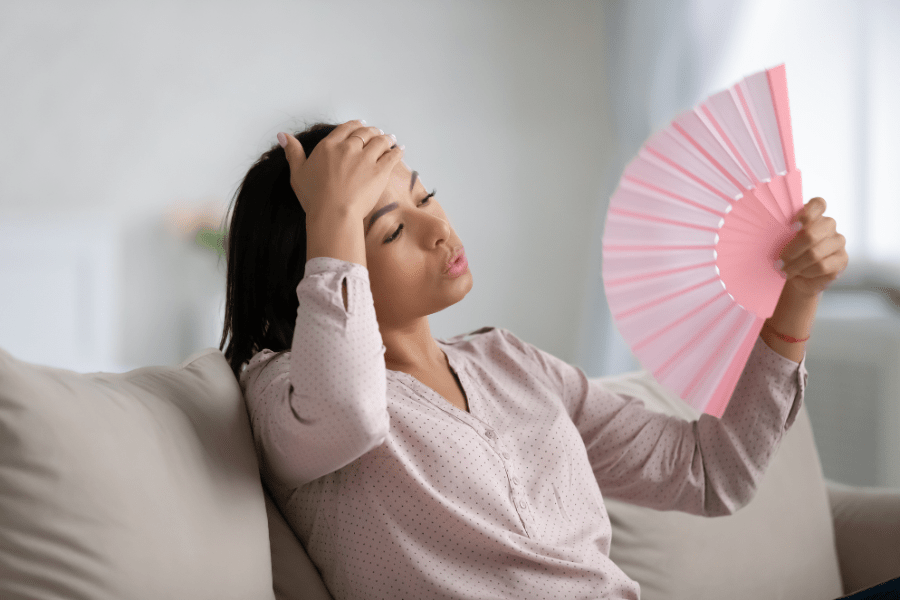Hormonal imbalance symptoms in females can be confusing and difficult to manage. There are a variety of potential causes and treatments, but the most important thing is understanding what’s going on with your body.
It’s possible that hormones like estrogen, progesterone, cortisol, testosterone, and DHEA can all play a role in hormonal imbalances. Symptoms vary from mild to severe and can include changes in mood, appetite, energy levels, sleep patterns, and more.
In this article, we’ll discuss the most common hormonal imbalance symptoms in women so that you can be aware of them and take steps to manage your health. We’ll also provide tips on how to identify and treat hormonal imbalances. By understanding the signs and symptoms, you can take steps toward feeling better.
This post is about the 15 hormonal imbalance symptoms in females.

Vital Hormones and their Function
Estrogen is one of the most important hormones in a female’s body. It helps regulate the menstrual cycle, fertility, and more. A hormonal imbalance caused by too much or too little estrogen can cause symptoms such as irregular periods, changes in mood, headaches, weight gain, and decreased sex drive. If you are experiencing these symptoms, it’s important to talk to your doctor about potential treatments.
Progesterone is another key hormone for a female’s health. It helps regulate the menstrual cycle and plays a role in a variety of other processes like pregnancy and breastfeeding. When progesterone levels get too low or too high due to an imbalance, there can be side effects such as heavy bleeding or irregular periods, depression, and weight gain.
Cortisol is a hormone that helps regulate your body’s stress response. When cortisol levels are too high due to an imbalance, you may experience fatigue, anxiety, difficulty sleeping, and changes in appetite. If you’re feeling these symptoms for more than two weeks it’s important to talk to your doctor about potential treatments.
Testosterone is another key hormone for a female’s health that can become imbalanced. Low testosterone levels can cause a variety of side effects including decreased energy levels, low libido, depression, and weight gain. It’s important to talk to your doctor if you think you may be experiencing any of these signs and symptoms.
DHEA is a hormone that helps regulate your energy level and mood, so it’s important to keep levels balanced. When DHEA levels become too low or too high, you may experience fatigue, depression, anxiety, and difficulty sleeping. If you are experiencing these symptoms for more than two weeks it’s important to talk to your doctor about potential treatments.

15 Signs and Symptoms of Hormonal Imbalance in Females
1. Unexplained Weight Gain or Loss:
Sudden or unexplained weight gain or loss, especially around the abdominal area, is a common symptom of hormonal imbalance in females.
2. Mood Swings and Anxiety:
Hormonal fluctuations can cause feelings of sadness, anxiety, mood swings, and depression. Women affected by this may also experience irritability and increased sensitivity to stressors.
3. Fatigue:
Feeling exhausted despite sleeping well could be a sign of a hormone imbalance, such as an overproduction of cortisol from stress or low levels of thyroid hormones which can lead to sluggishness all day long.
4. Insomnia:
Difficulty sleeping is another common symptom of hormonal imbalances in women. Even if you are getting enough sleep, some hormonal fluctuations can make it hard to fall asleep or stay asleep.
5. Infertility:
Hormonal imbalances are often the cause of infertility in women. Low levels of reproductive hormones such as luteinizing hormone (LH) and follicle-stimulating hormone (FSH) may prevent ovulation from occurring regularly.
6. Changes in Heart Rate:
When your heart rate changes without reason, this could be a sign of a hormone imbalance, particularly if you experience other symptoms as well.
7. Headaches and Migraines:
If headaches or migraines seem to come out of nowhere and last longer than usual, it might be due to an imbalance of hormones such as estrogen and progesterone.
8. Digestive Issues:
Hormonal imbalances can often lead to digestive issues, such as constipation, bloating, or diarrhea.
9. Hot Flashes and Night Sweats:
Hot flashes and night sweats are very common symptoms of hormone imbalances in women, especially during menopause when levels of estrogen begin to decrease.
10. Hair Loss:
Hair loss or thinning hair is another sign that your hormones may be out of balance. Low levels of certain hormones can cause your hair to become brittle and start falling out more easily than usual.
11. Acne Breakouts:
Unexpected acne flare-ups can also be an indication of a hormone imbalance, particularly in adult women.
12. Vaginal Dryness:
If you’re experiencing vaginal dryness or discomfort during sex that isn’t related to any other medical issue, it could be due to a hormonal imbalance. Low levels of estrogen can cause this symptom.
13. Breast Pain:
Breast pain is another common symptom of hormonal imbalances in women, especially during perimenopause and menopause. This can range from mild discomfort to severe pain that may radiate through the chest or arms.
14. Low Libido:
A decrease in libido can also be caused by a hormone imbalance, such as low levels of testosterone or estrogen. If your sex drive has suddenly decreased for no apparent reason, it could be due to an underlying hormonal issue.
15. Uterine Fibroids:
Uterine fibroids are non-cancerous tumors that can be caused by a hormonal imbalance in women. They typically cause pelvic pain, excessive menstrual bleeding, and frequent urges to urinate.
If you are experiencing any of these symptoms, it’s important to speak with your doctor as soon as possible for diagnosis and treatment. Hormonal imbalances can have serious long-term consequences if left untreated, so proper medical care is essential. With the right treatment plan, many hormonal imbalances in women can be managed successfully and relieve uncomfortable symptoms quickly.
Tips for Identifying and Treating Hormonal Imbalances in Females:
– Track your symptoms in a journal to determine when they occur and how long they last. This will help you and your doctor identify any patterns or triggers for your symptoms.
– Eat a healthy, balanced diet to ensure that you’re getting the vitamins, minerals, and other nutrients needed to support hormone production.
– Exercise regularly to reduce stress levels, which can help balance hormones naturally.
– Get adequate restful sleep on a regular basis; this helps regulate hormones like cortisol and melatonin.
– Reduce exposure to environmental toxins like pesticides and air pollution, as these can interfere with hormone function.
– Speak with your doctor about hormone replacement therapy or other treatments, such as acupuncture or herbal supplements, that may help balance your hormones.
– Try relaxation techniques like yoga, deep breathing, and meditation to help reduce stress levels and support hormonal balance.
By understanding the signs and symptoms of hormonal imbalances in females, you can take steps toward feeling better. If you are experiencing any of these symptoms, it’s important to speak with your doctor as soon as possible for diagnosis and treatment. Taking care of yourself is essential for maintaining good health.

Some of the most common causes of hormonal imbalance symptoms in females are:
– Stress: Too much stress can cause cortisol levels to be too high, which can lead to an array of health issues, including menstrual irregularities and infertility.
– Polycystic Ovarian Syndrome (PCOS): PCOS is a chronic disorder that affects hormone production in women. Symptoms include irregular menstrual cycles, acne, depression, weight gain, and excess facial hair growth.
– Menopause: During menopause, the body’s production of estrogen and progesterone begins to slow down. This change can cause hot flashes, night sweats, and other symptoms associated with hormonal imbalance.
– Eating habits: A diet low in protein, high in unhealthy fats, and too many simple carbohydrates can cause hormonal imbalances.
– Birth control pills: The hormones found in birth control pills may interfere with the body’s natural hormone production.
– Medications: Certain medications such as steroids and antidepressants can alter the body’s levels of hormones.
– Thyroid disease: Hypothyroidism or hyperthyroidism can both lead to an imbalance in certain hormones. Symptoms of thyroid conditions include fatigue, weight gain, depression, hair loss, and dry skin.
– Adrenal fatigue: Prolonged stress on the adrenal glands due to chronic illness or psychological distress can lead to a condition called adrenal fatigue that causes hormone irregularities.
– Aging: As women age, their levels of estrogen and progesterone begin to decline, leading to symptoms such as irregular periods and hot flashes.
– Poor sleep: Sleep deprivation can lead to an overproduction of cortisol, which can cause a variety of hormonal imbalances.
– Toxins: Exposure to environmental toxins (e.g., chemicals found in pesticides, paints, and solvents) has been linked to hormone imbalances.
– Lack of exercise: Exercise helps the body maintain appropriate levels of hormones, so a lack of regular activity can cause an imbalance.
– Genetic factors: Certain genetic conditions may be associated with hormone disturbances in women. Knowing your family history may help you identify any risks that you may have.
Foods that Cause Hormonal Imbalance in Females:
– Refined carbohydrates such as white bread, pasta, and sugar.
– Trans fats found in processed foods.
– Caffeine from coffee, tea, or energy drinks. (According to a NIH study conducted and published in 2012, the results indicated that caffeine consumption among women of child-bearing age influences estrogen levels. Causing estrogen levels to increase dramatically.) Read more here.
– Alcohol.
– Processed meats like bacon, hot dogs, and sausage.
– Foods with added hormones such as dairy products and meat.
– Certain vegetable oils like soybean, corn, and canola oil.
– High-mercury fish such as tuna, mackerel, and swordfish. In an article published by the Environmental Protection Agency, Exposures to the toxin Mercury can have serious effects on the entire body. Read more here.
– Artificial sweeteners like saccharin and aspartame.
By making healthy dietary changes and avoiding foods known to cause hormone imbalances, you can help regulate your hormones and improve your overall health. Eating a balanced diet rich in fruits, vegetables, healthy fats, and proteins can also help support hormone balance naturally.

Natural Remedies for Hormonal Imbalance in Females:
– Consume high-fiber foods such as legumes, fruits, and vegetables to help regulate hormones.
– Avoid caffeine and alcohol which can interfere with hormones.
– Get regular exercise to help reduce stress levels and support healthy hormone production.
– Practice relaxation techniques like yoga, deep breathing, or meditation to help reduce stress levels and support hormonal balance.
– Take herbal supplements to help support natural hormone production:
a. Chasteberry (Vitex agnus-castus): An herb from the Mediterranean region, chaste berry is known to balance hormones in women and reduce signs of premenstrual syndrome (PMS). It’s also believed to help normalize menstrual cycles and treat infertility caused by hormone imbalances.
b. Maca: A root vegetable native to Peru, maca has been traditionally used for centuries as an energizing tonic that helps promote endocrine system health. The plant contains compounds that have been shown to help regulate hormones, improve fertility, alleviate symptoms of menopause, and reduce anxiety.
c. Rhodiola Rosea: This adaptogenic herb is renowned for its ability to help manage stress levels. It’s also known to help balance hormones in women, including those related to reproductive health. This herb helps regulate estrogen levels and improve fertility.
d. Red Clover: The flowers of the red clover plant contain isoflavones, which are believed to help reduce symptoms of menopause, such as hot flashes and mood swings. Additionally, red clover is thought to have a beneficial effect on hormone levels in women with PCOS (polycystic ovary syndrome).
e. Dong Quai: Used for thousands of years in traditional Chinese medicine, dong quai has been found to help balance hormones and alleviate menstrual cramps. It’s also believed to improve reproductive health and fertility issues that can be caused by hormonal imbalances.
f. Ashwagandha: This powerful herb is known for its ability to combat stress and reduce anxiety. It’s also believed to help balance hormones in women, including those related to thyroid health and reproductive health. Additionally, ashwagandha has been found to improve fertility and promote regular menstrual cycles.
g. Licorice Root: This soothing herb can help support the adrenal glands, which are responsible for producing hormones like cortisol and adrenaline. It also helps regulate estrogen levels in the body, which can help alleviate PMS symptoms and reduce hormone-related infertility issues.

h. Black Cohosh: Another traditional remedy used in Native American medicine, black cohosh has been found to help balance hormones in women. It can help reduce symptoms of menopause, such as hot flashes and night sweats. It’s also believed to be beneficial for reproductive health.
i. Dandelion Root: This herb is a great source of vitamins and minerals that are essential for overall hormone balance and healthy endocrine function. It’s thought to be especially helpful for PCOS (polycystic ovary syndrome) and other hormonal imbalances in women due to its ability to regulate estrogen levels.
j. Holy Basil: Used in Ayurvedic medicine, holy basil is known for its calming effects on the nervous system and its ability to support adrenal gland function. It has been found to help regulate hormones
– Eat foods rich in omega-3 fatty acids like salmon, walnuts, chia seeds, and other sources of healthy fats which may help improve hormonal balance.
– Reduce your exposure to environmental toxins such as pesticides and air pollution, which can interfere with hormones.
By incorporating some of these natural remedies into your lifestyle, you can help support hormone balance naturally and reduce the symptoms associated with hormonal imbalances in females.
Conclusion:
It is clear that hormonal imbalance symptoms in females are very common and can affect various aspects of life. These symptoms can vary from mild to severe and range from weight gain, fatigue, mood swings, depression, anxiety, irregular periods, insomnia, acne breakouts, and more. It’s also important to understand that these symptoms may be caused by a variety of factors including diet, stress levels, or existing medical conditions.
Hormonal imbalances can cause a variety of uncomfortable and even painful symptoms in females, but they are often treatable. By understanding the signs and taking steps to manage them through diet, exercise, stress reduction techniques, and natural remedies, you can help balance your hormones and improve your overall health.
If you believe you may have a hormonal imbalance it’s best to speak with your doctor so they can rule out any underlying medical issues and help find a treatment plan that works for you. Remember that there is no one-size-fits-all approach when it comes to managing hormone imbalances but there are several steps you can take to help balance your hormones and improve your overall health. So if you’re experiencing any of these symptoms, don’t hesitate to speak with your doctor and start creating an action plan to ensure a healthier future for yourself.
If you enjoyed this article, don’t forget to share! Check out related post here.
I’m curious to know how these hormone balancing tips are improving your life. Please comment below and share so that we can create a more greener and holistic community

